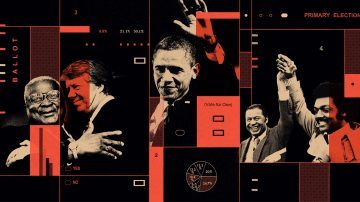Steve Kornacki in NBC News:
 Not that long ago, they were just a slender fraction of the party, one kept at arm’s length by presidential candidates. But today, black voters have emerged as a muscular political force and one of the most intensely courted constituencies in Democratic politics. In 2020, they are likely to account for at least one out of every four ballots cast in the party’s presidential primaries, more than tripling — and perhaps even quadrupling — the share they accounted for just a few decades ago. It’s a political and demographic revolution over the course of 40 years that we are able to document here through exit polling, which major media organizations have been sponsoring on a wide scale in every Democratic presidential primary race since 1976. But until now, much of this data has been hard to come by, unavailable online, walled off in academic archives, even discarded by the news media outlets that sponsored it.
Not that long ago, they were just a slender fraction of the party, one kept at arm’s length by presidential candidates. But today, black voters have emerged as a muscular political force and one of the most intensely courted constituencies in Democratic politics. In 2020, they are likely to account for at least one out of every four ballots cast in the party’s presidential primaries, more than tripling — and perhaps even quadrupling — the share they accounted for just a few decades ago. It’s a political and demographic revolution over the course of 40 years that we are able to document here through exit polling, which major media organizations have been sponsoring on a wide scale in every Democratic presidential primary race since 1976. But until now, much of this data has been hard to come by, unavailable online, walled off in academic archives, even discarded by the news media outlets that sponsored it.
But thanks to the assistance of William Mayer, a political scientist at Northeastern University and an expert on presidential campaigns, NBC News has assembled for the first time a publicly available state-by-state record of the black vote for each of the nine competitive national Democratic campaigns since the inception of widespread exit polling. (Read about our methodology here.) It begins in 1976, when the Voting Rights Act was barely a decade old, all-white-candidate fields were the norm, and the ties between African Americans and the Democratic Party were strained. And it extends through the 2016 campaign, by which point that bond had strengthened and sealed, all while a broader reshuffling had pushed older and blue-collar white voters toward the GOP and left Democrats more reliant than ever on support from nonwhite voters.
More here. (Note: Throughout February, at least one post will honor The Black History Month. This year’s theme is “African Americans and the Vote.” Readers are encouraged to send in their suggestions)
